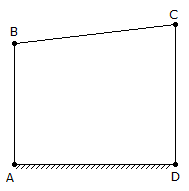Mechanical Engineering - Theory of machines - Discussion
Discussion Forum : Theory of machines - Section 9 (Q.No. 13)
13.
ABCD is a four bar mechanism in which AB = 310 mm and CD = 450 mm. AB and CD are both perpendicular to the fixed link AD, as shown in the below figure. If the velocity of B at this condition is v. Then the velocity of C is


Discussion:
20 comments Page 2 of 2.
Parashuram said:
6 years ago
At this condition velocity of B is equals to the velocity of C, because at this instant instantaneous center be lie at infinity otherwise velocity of B is not equal to the velocity of C.
Manish said:
6 years ago
A is the correct option. I too agree.
Sai Bharath said:
6 years ago
Velocity at C = CD/AB x velocity at B.
= 450/310 x v,
= 3/2 v.
So option C is correct.
= 450/310 x v,
= 3/2 v.
So option C is correct.
(1)
Pkumar said:
5 years ago
Assume v is the angular velocity then we can say C is the right answer.
(1)
Vinay BEL said:
5 years ago
Yes, A is the correct answer.
Vishal Prajapati said:
5 years ago
V = w.r
So, w=V/r
Then point A and D has same w.
So,
(V1/r1) = (V2/r2)
So,
(V/310) = (V2/450).
Then,
(45 V/ 31 ) = V2.
V2= 1.46 V.
It is near by 1.5 V.
So, w=V/r
Then point A and D has same w.
So,
(V1/r1) = (V2/r2)
So,
(V/310) = (V2/450).
Then,
(45 V/ 31 ) = V2.
V2= 1.46 V.
It is near by 1.5 V.
Vinay said:
5 years ago
Option A is the correct answer. Since crank and rocker are parallel to each other the coupler angular velocity becomes zero. So, Vb=Vc.
Abhishek savani said:
5 years ago
From velocity diagrams it is clear that Vb =Vc.
Vaibhav said:
5 years ago
A is the correct answer.
Sudhanshu said:
4 years ago
A will be the right answer.
Post your comments here:
Quick links
Quantitative Aptitude
Verbal (English)
Reasoning
Programming
Interview
Placement Papers
 v
v v
v v
v